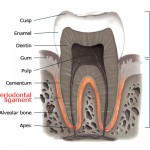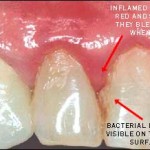A teeth cleaning appointment is also known as scaling. Every now and then every one of us would need a thorough scaling, because no matter how well we brush and floss and rinse, there will still be some minute debris left in our mouth between our teeth. These debris, after some period of time, will become hardened and these are known as calculus. There are two types of scaling – supragingival scaling, and subgingival scaling. Supragingival scaling is when the dentist only clears away the calculus that are above our gums, and can be seen in plain view. However, subgingival scaling is when the dentists cleans the calculus that are 1 – 2 mm below the gums. Sometimes, scaling is not sufficient for some patients with severe gum conditions, and root planning will be needed. Usually, root planning is needed when there is a gingival pocket more than 4 -5 mm, and there are tenacious calculus and necrotic cementum (refer to the picture to understand what is cementum) stuck to the roots of the teeth.
To carry out the scaling procedure, scalers are needed. There are two types of scalers. There first type is a hand scaler, and the second type is an ultrasonic scaler. If the dentist chooses to use the hand scaler, you will not feel anything much as the hand scaler is a finely crafted instrument. Different types of hand scalers are used for different teeth and different part of the mouth, so they are well suited to the curves and contours of each teeth and will not harm the surrounding tissues.
However, if the dentist chooses to use the ultrasonic scaler, you will feel the vibrations emitted from the instrument. The ultrasonic scaler also gives a jet of water while it is turned on to wash away the calculus that is dislodged from the tooth’s surface, therefore, if there is any gum recession or any cavities in your teeth, you will feel a sharp sensation when the water is sprayed onto the area. This sensation is known as sensitivity, akin to the sensitive sensation when we drink cold drinks or eat ice cream. If there is any gum recession leading to exposed root surfaces, this sensitivity can be decreased using toothpaste for sensitive teeth, like Sensodyne or Colgate pro-arginine. These toothpaste contains substance that will block the exposed tooth surface, rendering them less susceptible to sensitivity.
As the water is being emitted while scaling, sometimes, small sprays of water will fall onto your face and clothing. Usually the dentist will drape a napkin over your clothes and ask you to wear protective goggles. The goggles will also protect your eyes if any small specks of calculus gets into them accidentally. If the water is not being sucked up fast enough, it will also dribbles out from your mouth, in this situation, u can raise your hand and ask the assistant to suck up the water using a suction. It is important to not make any sudden or jerking movements with your head while the procedure is going on (or any other dental procedure, for that matter), because the instrument is sharp and might cut your tongue or other soft tissues.
When calculus builds up in our mouth, our gums will become inflamed, either mildly or severely, depending on the severity of the calculus buildup. Therefore, when the dentist starts scaling, it is normal for the gums to bleed. As long as you do not feel any severe pain, there is no need to worry at the sight of blood. However, if you are hypertensive or diabetic, it is very important for you to inform the dentist. Usually, dentist will take a brief medical history before he/she starts any procedure, however, if the dentist forgets, it is important that you inform the dentist about your medical condition. It is better to be safe than sorry, because hypertensive and diabetic patients tend to bleed more than the normal patient.
After scaling, it is normal to feel sensitive whenever u take hot or cold drinks and foods for a few days. This is because the calculus that was previously blocking the tooth surface has now been removed. However, this should only last for a couple of days, and if the sensitivity persists, you should consult back to the dentist. Some patients will also complain that their teeth feels ‘loose’ after scaling. This is because previously, the calculus has been holding on to the tooth, instead of the normal periodontium tissues. After scaling, if the gum recession and bone resorbtion is not severe, the periodontium should grow back, making the teeth ‘stable’ again. However, if the ‘loosening’ is too much, you should consult the dentist again.


